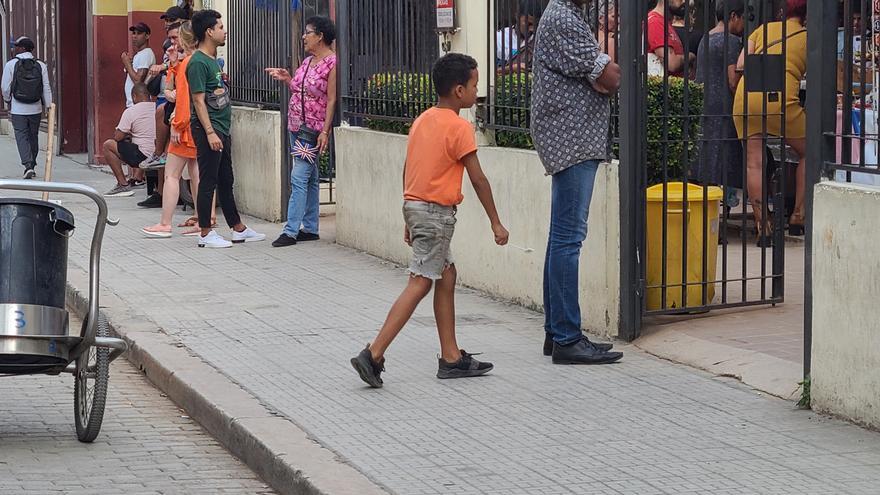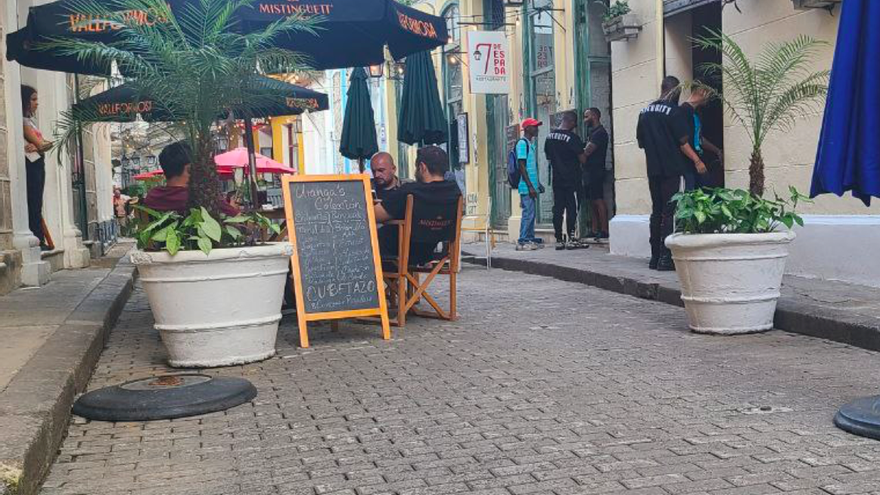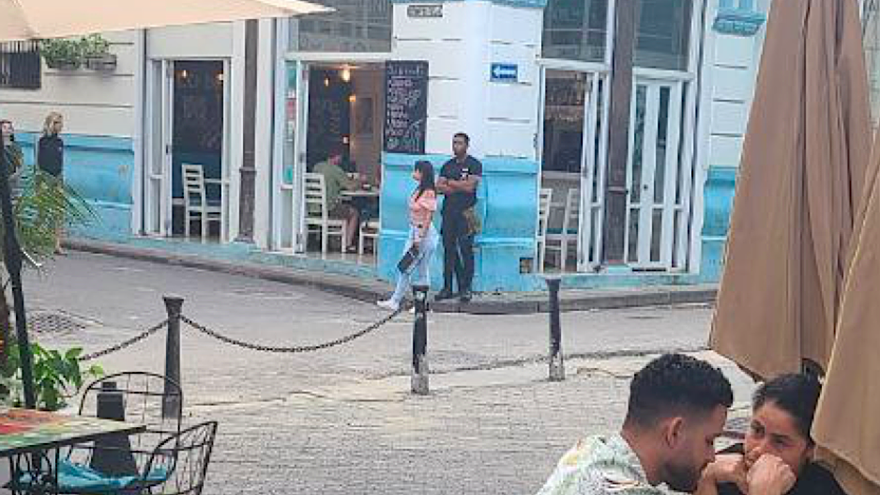
![]() 14ymedio, Nelson García/Juan Izquierdo, Havana, 11 November, 2023 — Several burly men, with black pullovers, guard the restaurants on the alley of Espada, on Peña Pobre Street in Old Havana. Their mission: to prevent the beggars, crazies and undesirables of the mythical Angel neighborhood from disturbing the clientele, usually foreigners, and they keep an eye on the children, true ninjas when it comes to stealing a wallet or picking the pocket of a distracted tourist.
14ymedio, Nelson García/Juan Izquierdo, Havana, 11 November, 2023 — Several burly men, with black pullovers, guard the restaurants on the alley of Espada, on Peña Pobre Street in Old Havana. Their mission: to prevent the beggars, crazies and undesirables of the mythical Angel neighborhood from disturbing the clientele, usually foreigners, and they keep an eye on the children, true ninjas when it comes to stealing a wallet or picking the pocket of a distracted tourist.
Antojos, 7 de Espada and Chacón 162 – three of the most expensive and well-known Havana restaurants – decided to pay attention to a situation that was already beyond the hands of the police. “They are children and we can’t do anything,” the officers alleged when a robbery was reported on the terraces. Hardened by poverty, at only 9 or 10 years old, the children of the area prepare to accept a candy while reaching out to someone else’s pocket, or to ask for alms with all kinds of stories and tricks.
“It all started with a nine-year-old boy who lives in this neighborhood. His father is in prison and he lives with his grandparents. He is the one who supports everyone at home,” a member of the staff of Antojos tells 14ymedio, whose administration is the one that provides the security service to the neighboring premises.
As the police declared themselves unable to control the flood of minors dedicated to looting – and also “recommended” a quick solution to the problem – the restaurant owners took it upon themselves to find one. First, the waiters and clerks tried to expel the boys, but this “affected the service,” says a source in Antojos. “People stopped coming, and we had to look for a security team,” he adds.

Although not as effectively as children, other beggars used to ask for money from those who come to eat at the “loma del Ángel,” as that corner of Old Havana is known. Now the job is more than difficult: stationed at the door of the premises, the guards prevent the beggars from even stepping past the ornamental pots at the entrance to the terraces. If anyone manages to reach a table, the security officer will have no qualms about grabbing him by the arm and escorting him out of the place. Whether or not they take him out violently or calmly depends on the beggar.
The results of the security personnel, who charge about 2,000 pesos for each day of work – in addition to tips and money to watch over the diners’ cars – are evident: “Security has ’scared off’ the children,” acknowledges a member of the Antojos staff. The beggars know where to look. Antojos as well as 7 de Espada and Chacón 162 have astronomical prices. Only those who can afford to pay dine there. In Chacón 162, a ceviche is sold at 1,300 pesos, beef carpaccio at 2,300 and a few croquettes at 530.
And those are just the starters. A lobster prepared “to your taste” costs 2,800 pesos, while the shrimp is 2,450. The most exclusive, without a doubt, is the octopus dish – a rarity in Havana – which in Chacón 162 is sold at 4,800 pesos.
“Now the clientele is quite balanced between Cubans and foreigners, because tourism is a little dead,” says a source to this newspaper, who prefers not to reveal the identity of the owner of the Antojos restaurant, someone known as “Reinaldo” and related by marriage to a high military official.

As for Chacón 162, its owner is José Héctor Argiles Agüero, who is proud on social networks of the visit to his premises of international figures such as the Spanish actor Mario Casas and the Mexican Gael García Bernal, the chef Pepe Rodríguez – presenter of the show Masterchef Spain – and the Cuban artists David Blanco, Raúl Paz and Carlos Acosta.
The comment that someone from the leadership of the regime protects the owners of the restaurants in the Espada alley is recurrent. Their ease of getting food – Antojos operated even during the pandemic, at home – and their decorations, with allusions to Republican Cuba, have been arousing suspicions among the poor neighbors of the Angel neighborhood for years.
Calling attention at the entrance to Antojos is a gigantic mural with the image of Celia Cruz – flanked by Benny Moré and Compay Segundo – whose music is still banned on Cuban stations. A sign with the word “Azúcar!”, which the singer made famous on the international stage, receives the diners.
“This area is for people with power,” acknowledges a staff member of Antojos to 14ymedio. The severity of the muscular guards, who guard the street once famous for the novel Cecilia Valdés, prove him right.
Translated by Regina Anavy
____________
COLLABORATE WITH OUR WORK: The 14ymedio team is committed to practicing serious journalism that reflects Cuba’s reality in all its depth. Thank you for joining us on this long journey. We invite you to continue supporting us by becoming a member of 14ymedio now. Together we can continue transforming journalism in Cuba.
